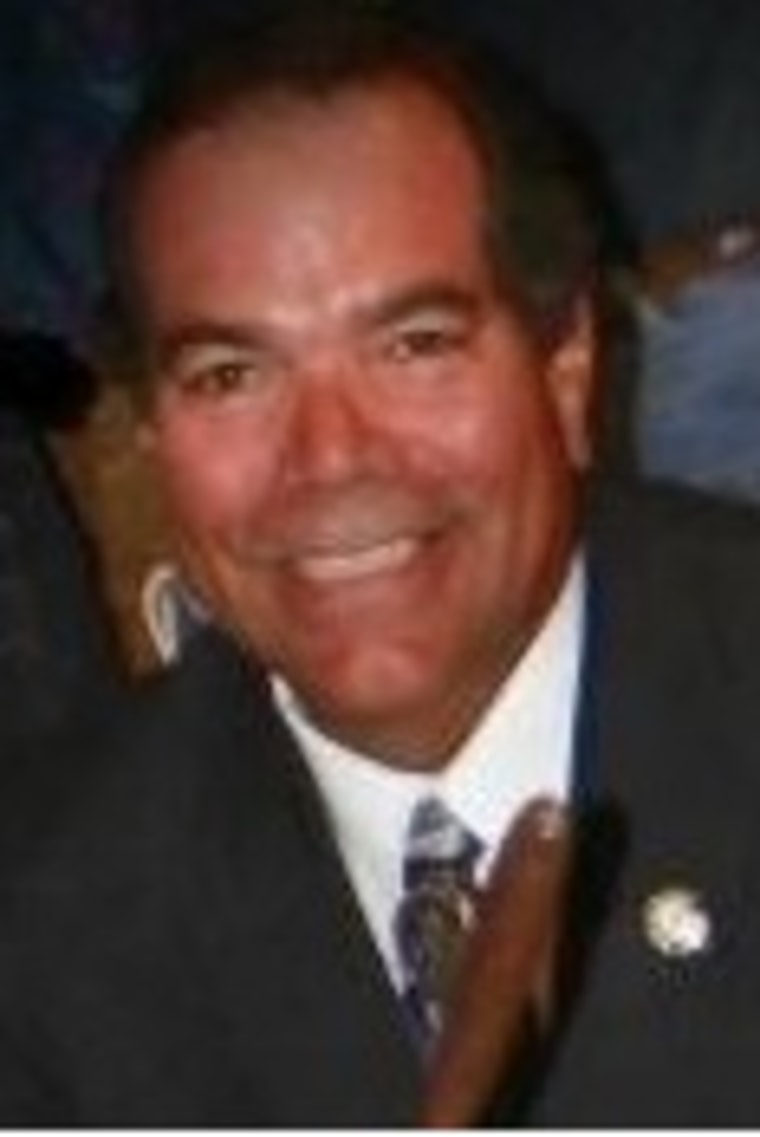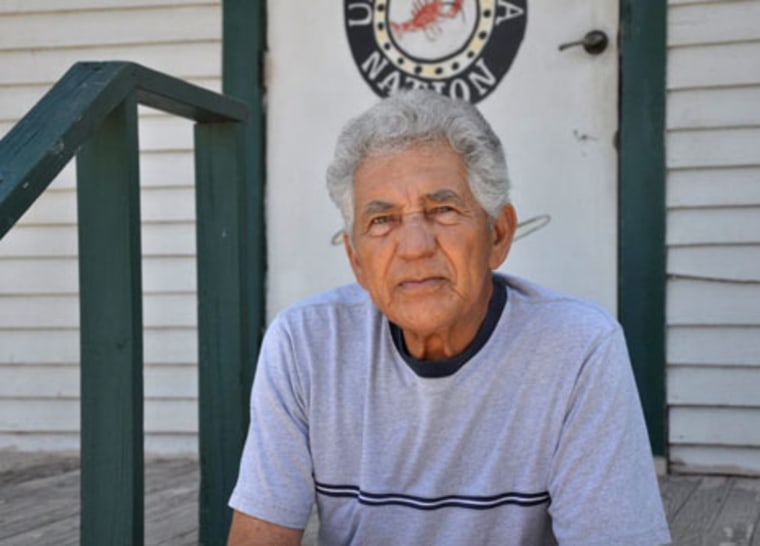Holidays in the bayou are different this year, says Laura Billiot.
Maybe the biggest difference was what wasn't on the table for Christmas dinner — seafood. Like many in the Native American Houma Nation, Billiot and her husband have long harvested shrimp and oysters from the waters of the Gulf of Mexico, both for food and income.
But just over five months after the BP oil spill was capped, they ate a Christmas dinner of ham, baked macaroni, "dirty rice" and gumbo — made with chicken and sausage, not seafood. Laura's oyster dressing, usually a highlight of the meal, also was conspicuously absent.
"(The oil spill) has changed our diet a lot," said Billiot a United Houma Nation councilwoman who lives in Golden Meadow, La. Despite assurances from federal government agencies that the seafood is safe, she remains uncertain.
"Everyone that has come to my (local tribal) meetings … says the same things," she said. "They are not trusting the seafood yet. They don't want to feed it to their children and their elderly parents."
Such uncertainty is a main staple for the Houma people these days. Even if they regain confidence in gulf seafood for their own families, they wonder when — or whether — the national appetite for the products will return. And if it does, will the fish and shrimp populations will be sufficient to meet the demand?
"We've been shrimpers all our married lives," said Billiot. "We know what we had, and spent accordingly. But, like this, you don't know. … Is there going to be a season next year?"

The United Houma Nation, with a current membership of about 17,000, is no stranger to adversity. The tribespeople have lived in the bayous and rivers of Louisiana for centuries and survived many challenges prior to the oil spill — including land grabs a century ago, civil rights abuses and, more recently, a series of strong hurricanes and degradation of the marshes that many members rely on for their livelihood.
They also have been battling a bureaucratic problem — and one that has come back to bite them in the wake of the BP disaster: The United Houma Nation, a state-recognized tribe, has never been federally recognized, though its 30-year-old pursuit of the designation continues.
Having survived four major hurricanes in the last five years, residents of these coastal marshes are accustomed to returning to storm-damaged homes, gutting them, and rebuilding. They know how to do it and what it costs.
Spill's long shadow
But the oil spill has created a new type of uncertainty, with an impact that is harder to gauge. Because of unanswered questions about long-term health and environmental impacts, many are struggling to decide how to proceed with damage claims.
On Dec. 13, Kenneth Feinberg, administrator of the Gulf Coast Claims Facility, offered a "quick payment" option for Gulf Coast residents affected by the spill — a lump sum of $25,000 for businesses or $5,000 for individuals who already had received emergency payments. The catch is this: Those who accept the payment by the deadline of Aug. 22, 2013, also sign away their rights to sue or pursue additional claims through the GCCF in the future.
The offer was intended to clear up the huge backlog of claims from residents who said they had suffered financial damages from the oil spill and to prevent as many lawsuits as possible. But it angered and confused many of the Houma people.
"We're not going to get a good count on (the shrimp population) until May," said Houma tribal Chief Thomas Dardar, who lives on Blue Bayou, deep in Terrebonne Parish, La. "The oil sank from the top, but it's still traveling. How much will come into our estuaries in the springtime? Only time can tell that. … Even the scientists say we're going to have to wait and see."
There are still two other ways to make claims, according to the GCCF: One is to file for "interim payments" for past damages caused by the oil spill, without giving up the right to pursue additional money. This process replaces the emergency funds that were being made available through Nov. 23.
Another option is to file a "final payment" claim for past, present and future damages if the claimant believes they can prove more damage than is being covered by the "quick pay." But the documentation requirements, uncertainty of outcome, and seemingly inconsistent decisions coming out of the GCCF are likely to deter many people from this path.
Quick payment dilemma
And, as Chief Dardar says, some in his community are too hard up to forgo the lump sum.
"If you're faced with being hungry and cold, that $25,000 looks pretty good. … It's a sure thing," he said. "Or you (could) take your chances in court and wind up with nothing."
One of the tribal elders, 74-year-old Antoine "Whitney" Dardar knows the quandary first hand. He received a couple of emergency payments initially. Then, though he filed more than 100 pages of financial records documenting 20 years worth of seafood sales, along with a letter from his pastor stating that he has been a commercial fisherman his whole life, Dardar's claim against BP was rejected by Feinberg's claims reviewers.
He's still wrestling with whether to take the "quick pay" option, or pursue a potentially more satisfying claim, said his daughter, Brenda Dardar-Robichaux, who served as tribal chief for 13 years until June.
"He's not one to challenge," she said of her father. "Just having to ask for assistance is difficult. He just wants to be out on his boat earning a living as he always has."
Even after the waters were reopened to commercial fishing this summer and fall, the elder Dardar only went out trawling a few times during the shrimp season, which has just ended. He sold his catch to factories, but didn't bring anything home to share with friends and family because of his concerns over the safety of the seafood, his daughter said. Oyster season just opened, but he's not touching his oyster beds, which lie close to areas where spill response crews set up oil booms to contain the slick.
"This time of year he would be oystering. He always had the biggest, fattest, saltiest oysters," said Dardar-Robichaux. "This year he's afraid someone will get ill and he will be responsible. … He loses sleep over it."
Help for the tribe
Tribal leaders have been trying to get compensation for the tribe as a whole to assist Houma fishermen, as well as net-makers, seafood processers and others who rely on the marsh economy, so far without luck.
The tribe sent a proposal to BP and to Feinberg's organization seeking about $500,000 for financial assistance to tribal members, provision of services like job training and mental and physical health services and to conduct additional independent seafood testing.
But after several promising meetings, the proposal was rejected, said Chief Dardar, for a familiar reason:
"The response was you're not a federally recognized tribe so we can't help," he said.
Kirk Charamie, program director of the Houma public radio station in Golden Meadow, who was involved in the effort to obtain aid, said the decision fails to reflect the serious harm the spill has inflicted on the tribe as a whole.
"There was damage to the institution of the United Houma Nation," he said. "If the seafood is found not to be safe, or the prices don't come back … the tribe as a whole is in jeopardy. I thought there was a dollar amount that could be put on that … to assist the citizens."
Now Chief Dardar and tribal staffers are working on a grant proposal with the help of local universities for programs that assess the mental and physical wellbeing of Houma members living in low-lying areas. This new challenge will be at the top of his agenda.
"We came in realizing the monumental task we have ahead of us," said Dardar, who became chief as oil was still gushing from the broken well. "When a hurricane comes you can move people, but this one… It's going to be here a long time, and you have to set out for the future of our tribe and its health and pray for the best. And hope the resiliency of our people remains strong."
